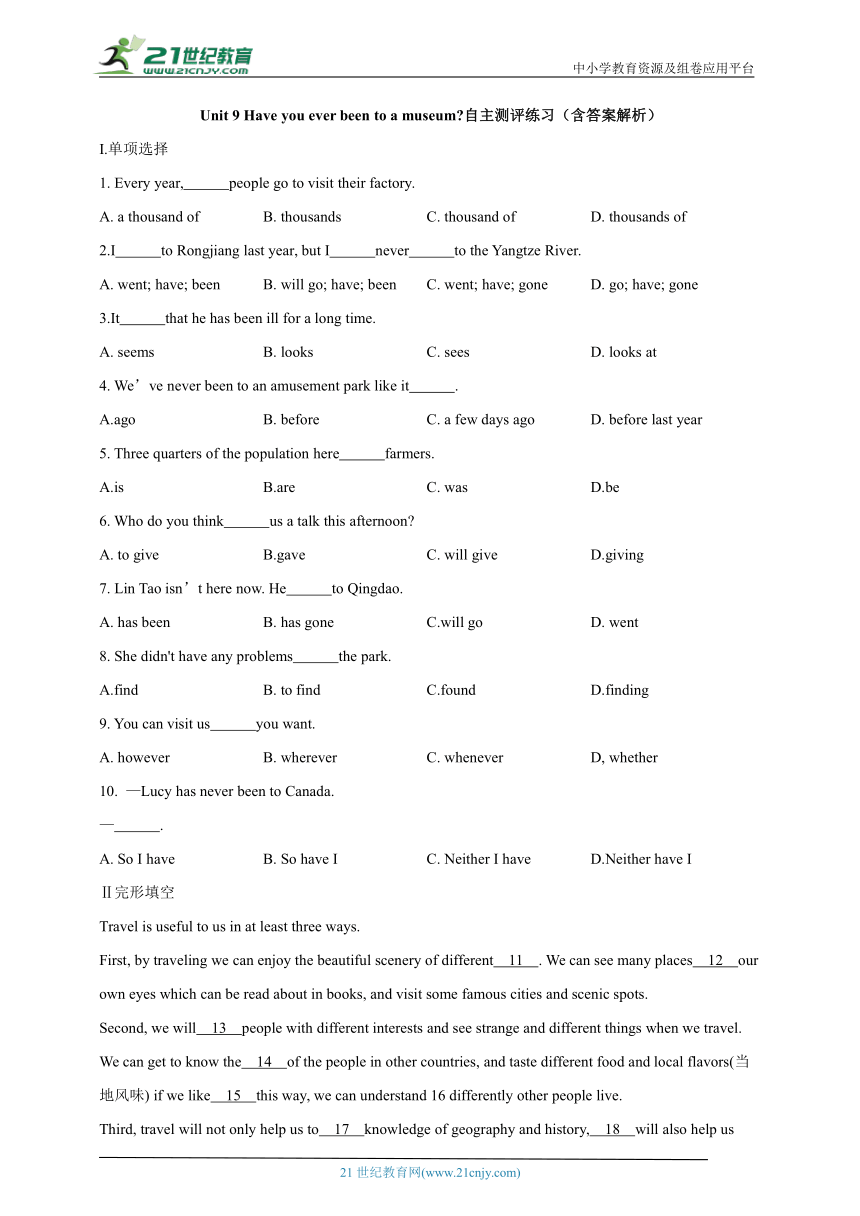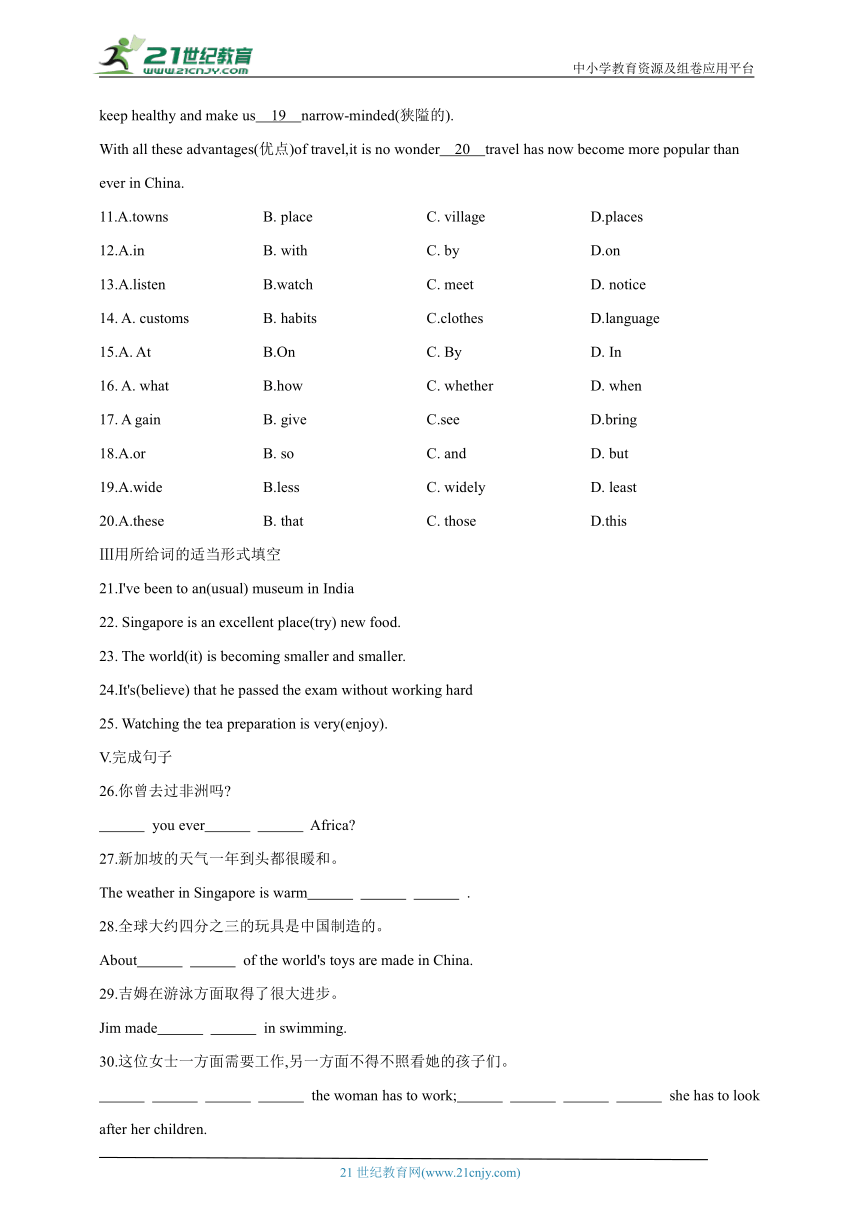Unit 9 Have you ever been to a museum?自主测评练习(含答案解析)【人教英语八下】
文档属性
| 名称 | Unit 9 Have you ever been to a museum?自主测评练习(含答案解析)【人教英语八下】 |  | |
| 格式 | docx | ||
| 文件大小 | 281.6KB | ||
| 资源类型 | 试卷 | ||
| 版本资源 | 人教新目标(Go for it)版 | ||
| 科目 | 英语 | ||
| 更新时间 | 2025-03-01 18:43:38 | ||
图片预览


文档简介
中小学教育资源及组卷应用平台
Unit 9 Have you ever been to a museum 自主测评练习(含答案解析)
I.单项选择
1. Every year, people go to visit their factory.
A. a thousand of B. thousands C. thousand of D. thousands of
2.I to Rongjiang last year, but I never to the Yangtze River.
A. went; have; been B. will go; have; been C. went; have; gone D. go; have; gone
3.It that he has been ill for a long time.
A. seems B. looks C. sees D. looks at
4. We’ve never been to an amusement park like it .
A.ago B. before C. a few days ago D. before last year
5. Three quarters of the population here farmers.
A.is B.are C. was D.be
6. Who do you think us a talk this afternoon
A. to give B.gave C. will give D.giving
7. Lin Tao isn’t here now. He to Qingdao.
A. has been B. has gone C.will go D. went
8. She didn't have any problems the park.
A.find B. to find C.found D.finding
9. You can visit us you want.
A. however B. wherever C. whenever D, whether
10. —Lucy has never been to Canada.
— .
A. So I have B. So have I C. Neither I have D.Neither have I
Ⅱ完形填空
Travel is useful to us in at least three ways.
First, by traveling we can enjoy the beautiful scenery of different 11 . We can see many places 12 our own eyes which can be read about in books, and visit some famous cities and scenic spots.
Second, we will 13 people with different interests and see strange and different things when we travel. We can get to know the 14 of the people in other countries, and taste different food and local flavors(当地风味) if we like 15 this way, we can understand 16 differently other people live.
Third, travel will not only help us to 17 knowledge of geography and history, 18 will also help us keep healthy and make us 19 narrow-minded(狭隘的).
With all these advantages(优点)of travel,it is no wonder 20 travel has now become more popular than ever in China.
11.A.towns B. place C. village D.places
12.A.in B. with C. by D.on
13.A.listen B.watch C. meet D. notice
14. A. customs B. habits C.clothes D.language
15.A. At B.On C. By D. In
16. A. what B.how C. whether D. when
17. A gain B. give C.see D.bring
18.A.or B. so C. and D. but
19.A.wide B.less C. widely D. least
20.A.these B. that C. those D.this
Ⅲ用所给词的适当形式填空
21.I've been to an(usual) museum in India
22. Singapore is an excellent place(try) new food.
23. The world(it) is becoming smaller and smaller.
24.It's(believe) that he passed the exam without working hard
25. Watching the tea preparation is very(enjoy).
V.完成句子
26.你曾去过非洲吗
you ever Africa
27.新加坡的天气一年到头都很暖和。
The weather in Singapore is warm .
28.全球大约四分之三的玩具是中国制造的。
About of the world's toys are made in China.
29.吉姆在游泳方面取得了很大进步。
Jim made in swimming.
30.这位女士一方面需要工作,另一方面不得不照看她的孩子们。
the woman has to work; she has to look after her children.
Unit 9 Have you ever been to a museum 自主测评练习(答案解析)
1.D 当 thousand 前有具体的数词时,用单数形式;当其表示不具体的数目时,用复数形式,且跟of连用。
2.A 句意:我去年去了榕江,但是我从没去过长江。由 last year可知,前半句为一般过去时。have gone to 表示“到某地去了”,不符合句意,故选A。
3.A It seems that ...为固定句型,意为“似乎..."
4.B ago用于一般过去时;before指从过去算起的若干时间以前,常用于完成时态中。
5.B 分数或百分数修饰 population 作主语时,谓语动词常用复数形式。
6.C do you think 是插入语,将其去掉的话,剩余部分用陈述语序。
7.B 由“Lin Tao isn’t here now.”可知,林涛不在说话现场,此处应表示“他去了青岛”。表示“去了某地(还没有回来)”应用have/has gone to。
8.D have problems(in)doing sth.意为“做某事有困难”。
9.C however“无论如何;不管怎样”;wherever“无论什么地方”;whenever“无论何时”;whether“是否”。句意:你想什么时候拜访我们都可以。
10.D “neither十助动词/be 动词/情态动词+(另一)主语”表示否定,意为“另一方也不......”;“so+助动词/be 动词/情态动词+(另一)主语”表示肯定,意为“另一方也..."上句为否定句,意为“露西从未去过加拿大。”,由此可知下句句意应为“我也没去过。”,故选D。
11.D different后接可数名词的复数形式,且place 比town 涉及的范围更广。
12.B with表示“用...”,此处指用限睛来看。
13.C 由句意可知此处指我们可以见到有着不同爱好的人。
14.A 由常识知“不同国家的人应有不同的风俗习惯”。
15.D in this way 为固定搭配,意为“通过这种方式”。
16.B 此处how 引导感叹句。
17.A 此处指旅行能使我们增长地理和历史知识。
18.D not only ... but(also) ... 意为“不仅...而且.....”,为固定搭配.
19.B 此处为暗含的比较,故用比较级。
20.B that引导主语从句,it 作形式主语。
21. unusual
22.to try
23.itself
24.unbelievable
25.enjoyable
26. Have; been to
27. all year round
28. three quarters/fourths
29. great progress
30. On the one hand; on the other hand
21世纪教育网 www.21cnjy.com 精品试卷·第 2 页 (共 2 页)
21世纪教育网(www.21cnjy.com)
Unit 9 Have you ever been to a museum 自主测评练习(含答案解析)
I.单项选择
1. Every year, people go to visit their factory.
A. a thousand of B. thousands C. thousand of D. thousands of
2.I to Rongjiang last year, but I never to the Yangtze River.
A. went; have; been B. will go; have; been C. went; have; gone D. go; have; gone
3.It that he has been ill for a long time.
A. seems B. looks C. sees D. looks at
4. We’ve never been to an amusement park like it .
A.ago B. before C. a few days ago D. before last year
5. Three quarters of the population here farmers.
A.is B.are C. was D.be
6. Who do you think us a talk this afternoon
A. to give B.gave C. will give D.giving
7. Lin Tao isn’t here now. He to Qingdao.
A. has been B. has gone C.will go D. went
8. She didn't have any problems the park.
A.find B. to find C.found D.finding
9. You can visit us you want.
A. however B. wherever C. whenever D, whether
10. —Lucy has never been to Canada.
— .
A. So I have B. So have I C. Neither I have D.Neither have I
Ⅱ完形填空
Travel is useful to us in at least three ways.
First, by traveling we can enjoy the beautiful scenery of different 11 . We can see many places 12 our own eyes which can be read about in books, and visit some famous cities and scenic spots.
Second, we will 13 people with different interests and see strange and different things when we travel. We can get to know the 14 of the people in other countries, and taste different food and local flavors(当地风味) if we like 15 this way, we can understand 16 differently other people live.
Third, travel will not only help us to 17 knowledge of geography and history, 18 will also help us keep healthy and make us 19 narrow-minded(狭隘的).
With all these advantages(优点)of travel,it is no wonder 20 travel has now become more popular than ever in China.
11.A.towns B. place C. village D.places
12.A.in B. with C. by D.on
13.A.listen B.watch C. meet D. notice
14. A. customs B. habits C.clothes D.language
15.A. At B.On C. By D. In
16. A. what B.how C. whether D. when
17. A gain B. give C.see D.bring
18.A.or B. so C. and D. but
19.A.wide B.less C. widely D. least
20.A.these B. that C. those D.this
Ⅲ用所给词的适当形式填空
21.I've been to an(usual) museum in India
22. Singapore is an excellent place(try) new food.
23. The world(it) is becoming smaller and smaller.
24.It's(believe) that he passed the exam without working hard
25. Watching the tea preparation is very(enjoy).
V.完成句子
26.你曾去过非洲吗
you ever Africa
27.新加坡的天气一年到头都很暖和。
The weather in Singapore is warm .
28.全球大约四分之三的玩具是中国制造的。
About of the world's toys are made in China.
29.吉姆在游泳方面取得了很大进步。
Jim made in swimming.
30.这位女士一方面需要工作,另一方面不得不照看她的孩子们。
the woman has to work; she has to look after her children.
Unit 9 Have you ever been to a museum 自主测评练习(答案解析)
1.D 当 thousand 前有具体的数词时,用单数形式;当其表示不具体的数目时,用复数形式,且跟of连用。
2.A 句意:我去年去了榕江,但是我从没去过长江。由 last year可知,前半句为一般过去时。have gone to 表示“到某地去了”,不符合句意,故选A。
3.A It seems that ...为固定句型,意为“似乎..."
4.B ago用于一般过去时;before指从过去算起的若干时间以前,常用于完成时态中。
5.B 分数或百分数修饰 population 作主语时,谓语动词常用复数形式。
6.C do you think 是插入语,将其去掉的话,剩余部分用陈述语序。
7.B 由“Lin Tao isn’t here now.”可知,林涛不在说话现场,此处应表示“他去了青岛”。表示“去了某地(还没有回来)”应用have/has gone to。
8.D have problems(in)doing sth.意为“做某事有困难”。
9.C however“无论如何;不管怎样”;wherever“无论什么地方”;whenever“无论何时”;whether“是否”。句意:你想什么时候拜访我们都可以。
10.D “neither十助动词/be 动词/情态动词+(另一)主语”表示否定,意为“另一方也不......”;“so+助动词/be 动词/情态动词+(另一)主语”表示肯定,意为“另一方也..."上句为否定句,意为“露西从未去过加拿大。”,由此可知下句句意应为“我也没去过。”,故选D。
11.D different后接可数名词的复数形式,且place 比town 涉及的范围更广。
12.B with表示“用...”,此处指用限睛来看。
13.C 由句意可知此处指我们可以见到有着不同爱好的人。
14.A 由常识知“不同国家的人应有不同的风俗习惯”。
15.D in this way 为固定搭配,意为“通过这种方式”。
16.B 此处how 引导感叹句。
17.A 此处指旅行能使我们增长地理和历史知识。
18.D not only ... but(also) ... 意为“不仅...而且.....”,为固定搭配.
19.B 此处为暗含的比较,故用比较级。
20.B that引导主语从句,it 作形式主语。
21. unusual
22.to try
23.itself
24.unbelievable
25.enjoyable
26. Have; been to
27. all year round
28. three quarters/fourths
29. great progress
30. On the one hand; on the other hand
21世纪教育网 www.21cnjy.com 精品试卷·第 2 页 (共 2 页)
21世纪教育网(www.21cnjy.com)
同课章节目录
- Unit 1 What's the matter?
- Section A
- Section B
- Unit 2 I'll help to clean up the city parks.
- Section A
- Section B
- Unit 3 Could you please clean your room?
- Section A
- Section B
- Unit 4 Why don't you talk to your parents?
- Section A
- Section B
- Unit 5 What were you doing when the rainstorm came
- Section A
- Section B
- Review of Units 1-5
- Unit 6 An old man tried to move the mountains.
- Section A
- Section B
- Unit 7 What's the highest mountain in the world?
- Section A
- Section B
- Unit 8 Have you read Treasure Island yet?
- Section A
- Section B
- Unit 9 Have you ever been to a museum?
- Section A
- Section B
- Unit 10 I've had this bike for three years.
- Section A
- Section B
